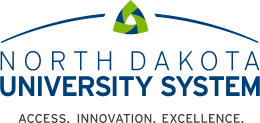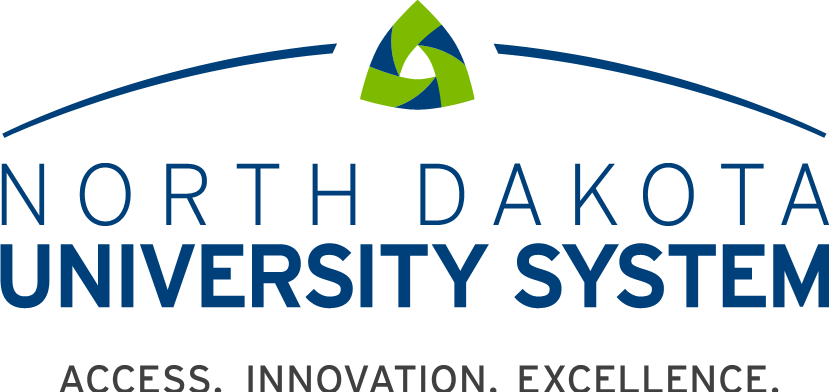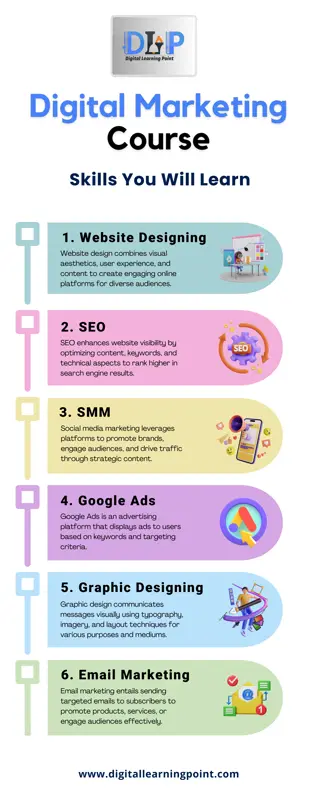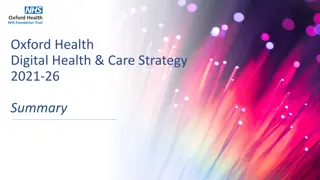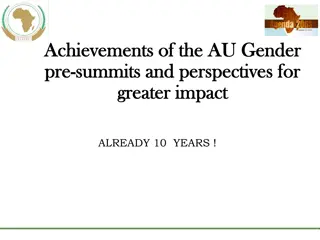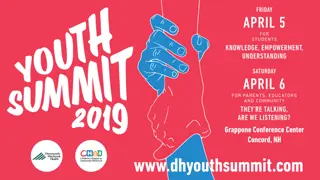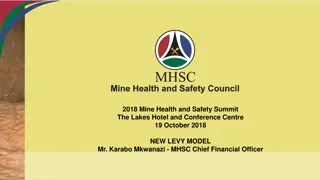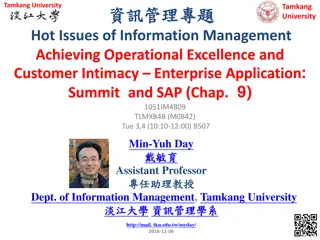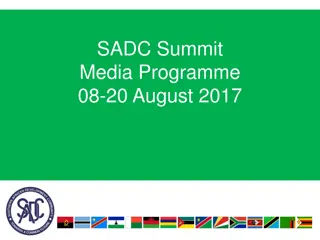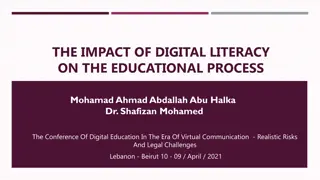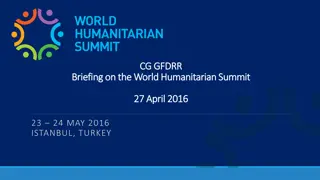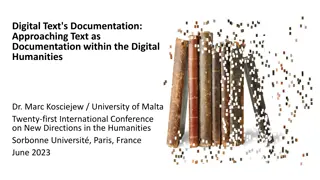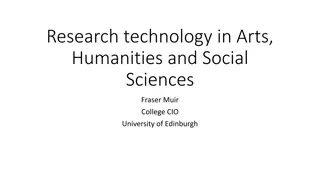Envision Summit - Digital Sciences
Teach and prepare our students for the changing digital landscape so they can enter the workforce ready to make substantial contributions to society.
Download Presentation

Please find below an Image/Link to download the presentation.
The content on the website is provided AS IS for your information and personal use only. It may not be sold, licensed, or shared on other websites without obtaining consent from the author.If you encounter any issues during the download, it is possible that the publisher has removed the file from their server.
You are allowed to download the files provided on this website for personal or commercial use, subject to the condition that they are used lawfully. All files are the property of their respective owners.
The content on the website is provided AS IS for your information and personal use only. It may not be sold, licensed, or shared on other websites without obtaining consent from the author.
E N D
Presentation Transcript
SUMMIT Digital Sciences November 1, 2023 1
Teach and prepare our students for the changing digital landscape so they can enter the workforce ready to make substantial contributions to society. Identify if this is a Call to Action 2
Study Group Participants Ken Nygaard, NDSU Professor Emeritus of Computer Science, founder Dakota Digital Academy Andy Armacost, UND President, Co-Chair Curt Biller, SBHE Member and President of Strengths, Inc., Co-chair Sue Pfeifer, VCSU, Professor, Computer Science Josh Christy Codelation Founder, North Dakota State Representative Shereen Stark, Sparklight, General Manager Woei Hung, UND, Professor of Education, Director of Instructional Design and Technology Program Jeremy Straub, NDSU, Associate Professor of Computer Science Katie Kempel, UND student, Mechanical Engineering Terry Zimmerman, Packet Digital, CEO Darin King, Vice Chancellor, IT, North DakotaUniversity System Greg Syrup, 701 Fund, tech fund manager Mark Gorenflo, NDUS Dir of Innovation and Economic Development Eric Nelson, Creedence Energy, Director of Technology 3
Defining Digitization Use of digital tools in the world, including for decision-making, understanding, predicting, and learning. Digital transformation seeks to make profound changes to business (or academic) operations with the adoption of rapidly changing technologies. Note that while the world focuses on Artificial Intelligence, examples of technologies to consider: o General use of digital tools (hardware and software) o Cloud storage and computing o Artificial Intelligence and Machine Learning o Metaverses and other digital worlds o Cybersecurity and data science o Quantum computing o Blockchain o Ethical, legal, policy issues 4
Focus Topics: How does Digitization Impact: 1. What we teach 2. The way we teach 3. How our campuses operate 4. The role of campuses on what it means to be human 5
What we teach What do we teach in the curriculum to prepare our students better for entering the workforce and for making substantial contributions to society? Specific digital disciplines that the NDUS should offer Impact on what we teach in non-digital disciplines General Ed requirements for digital literacy among all students Determining black box versus glass box approaches Preparing ND K-12 educators for computer science cybersecurity requirements 6
What we teach Methods/data sources Support Needed Campus curriculum actions SBHE policy changes Workforce innovation needs (Legis) Digital learning at other universities Tech trends in industry Career trends in industry Sub-group Connections to other groups POF: Agriculture POF: Energy POF: Healthcare Values of the future Nygaard Gorenflo Syrup 7
The way we teach How does digitization impact the way that we teach, design courses, and assess student learning? Use of digital tools in assessment, course design, and online/metaverse course delivery Preparing K-12 teachers more effectively for requirements levied by ND Leveraging technology appropriately for in-person & online How to scale in a dynamic environment? Providing resources for experimentation Opportunities for personalized learning Connection of K-12 learning approach on college/university approach 8
The way we teach Methods/data sources Support Needed Faculty development support Infrastructure support needs Coordination with Department of Public Instruction (DPI) Educause (primary professional society for educational technology) EAB and other professional study groups Sub-group Connections to other groups Pfeifer Straub King Programs of the Future POF: Agriculture POF: Energy POF: Healthcare 9
How campuses operate How do we position our campuses to operate in the world of growing digitization, including how we offer support services to students, faculty, and staff? - What is the impact of technology for both the in-person and online experiences? - How do we leverage technology to promote greater involvement? - How do we use technology to make operations more efficient and accessible? - Access and protection of critical data 10
How campuses operate Methods/data sources Support Needed Infrastructure support needs SBHE & NDUS adoption of data policies Educause (primary professional society for educational technology) EAB and other professional study groups Sub-group Connections to other groups Hung Kempel Christy Infrastructure of the future Student of the future Teacher of the future Human capital of the future 11
College and what it means to be human How do our colleges and universities amplify their focus on non- technical areas in the interface between humans and tools/machines? Reinforce the value of 2-year, 4-year, and graduate degree programs Reinforce the value of liberal arts and humanities education Offer connected programs in technology, ethics, and policy Counter the Stolen Focus Maintain flexibility in programs (e.g., stackable certificates) Promote the importance of the very human things we are good at and nurturing creativity, critical thinking, communication, policy, and ethics, now in partnership with new technology. Technology offers the opportunity to make life more accessible 12
College and what it means to be human Methods/data sources Support Needed SBHE adjust strategic goals as needed The Age of AI Kissinger, et al. Gartner and other thought leaders Sub-group Connections to other groups Nelson Stark Zimmerman Student of the future Teacher of the future Values of the future 13
Intersection with other groups How campuses operate What do we teach? X X X X The way we teach X X X X X To be human POF: Agriculture POF: Energy POF: Healthcare Student of the future Teacher of the future Infrastructure of the future Human Capital of the future Values of the future X X X X X X X X 14
SUMMIT Digital Sciences Curt Biller SBHE Board Member curtis.biller.sbhe@ad.ndus.edu (701) Andy Armacost UND President andrew.armacost@und.edu (701) 777-2626 15



